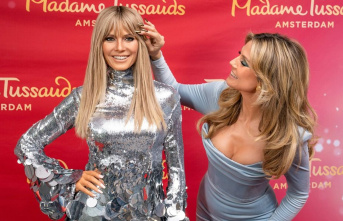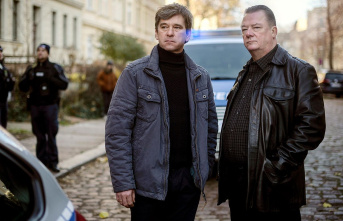Ms. Roos, you were born in 1949, the year the Federal Republic of Germany was founded. Her parents were classic representatives of this time: her mother was a rubble woman, her father a war invalid. What values did your parents pass on to you? My parents could not have been more different: my mother was a slightly criminal, always funny person from the Rhineland, who liked to live past the tax office. My father, on the other hand, was a rock solid man who never lied. These are very different values that I've noticed. But you can live with that wonderfully: In the event of the greatest catastrophe, you can still laugh and not take yourself so seriously.
In retrospect, this period is often portrayed as a very tough time when people created to rebuild and put their own needs aside. Yes, but progress was fast: the butcher shops had sausages again, everything was available to buy again. And there was a spirit of optimism: everyone could be anything. For example, I remember the director of a major entertainment show who never learned anything. It was pure adventure – you could try yourself.
What do you remember? It was the heyday of television shows. There were the first televisions, the first game shows. The whole family sat together. That was a great camaraderie. Everything was new - and after the disaster years everything was beautiful.
In the 1960s, however, young people rebelled against their parents. There was also new music, the Beatles and the Rolling Stones. That was the first revolution of young people that I was able to witness. You could still provoke with your haircut. I was a Beatles fan back then.
When talk of free love spilled over from America at the end of the 1960s, you got married - at the age of 19. That never happened in my life. Nobody said: I want to sleep with you tonight. Today we talk about everything - that wasn't the case back then. It was a very prudish time.
Would free love have been something for you? I've always been in favor of self-determination - even back then. On the other hand, my career was already gaining momentum back then, so I didn't have that much time to think.
You started as a child star in the 50's and became a really successful singer in the 70's. Was there a point along the way where you made a conscious decision to become an artist? I never planned and pretty much just fell into everything. I let everything come my way and struck at the right moment. My motto has always been: somehow it will work out.
In 1984 you sang for Germany at the Grand Prix for the second time after 1972. On the day of your performance you received a call. A woman told you that your husband Werner Böhm is cheating on you. That was one of my worst moments. I was as white as the dress. I was remote controlled. I really loved this man very much, but I knew immediately that this woman spoke the truth.
Despite this, the marriage lasted a few more years. Yes, I am someone who is very forgiving. I stay very long
When you were on a talk show with Frank Elstner a few years ago, you didn't want to talk about the experience. Did you find it hard to write about it in the book now? I don't like being personally affected on television: someone on talk shows is always suffering from a serious illness. I didn't want to be confronted with anything out of pity. But "Aufrecht geh'n" is an autobiographical book - it's part of it. When I was writing with Pe Werner, a lot of things that I had completely forgotten came up again. We laughed and cried together - literally.
You ended your career as a singer. Is this final? Yes, and I haven't regretted it for a second. It was clear to me: That's it now. Nothing better is coming. I don't want people to watch me grow older.
What role does music still play in your life? My direction has completely changed. I only listen to classical music: piano concertos, symphonies. Maybe also because it relaxes me so much. But then I also listen to really wild things: the Rolling Stones. I have all their records. All.
Which current artists do you appreciate?Helene Fischer. For me, this is a talent of the century. She can do everything and has worked very hard for it. She was a musical singer, that's the hardest job there is. You have to deliver. And she has this desire to go beyond her limits. Sometimes even too much. As far as I'm concerned, she doesn't need to do any acrobatic things. But she does it - and she does it with love.
What was the most astonishing realization for you while working on your book? At first I didn't remember so many things, but then, in a conversation with Pe Werner about the book, everything suddenly came back. But I'm happy that at 73 I'm still curious and I can still do whatever I want.
Mary Roos: "Getting Upright: My Dissolute Life", recorded by Pe Werner. Rowohlt, 272 pages, 22 euros.












